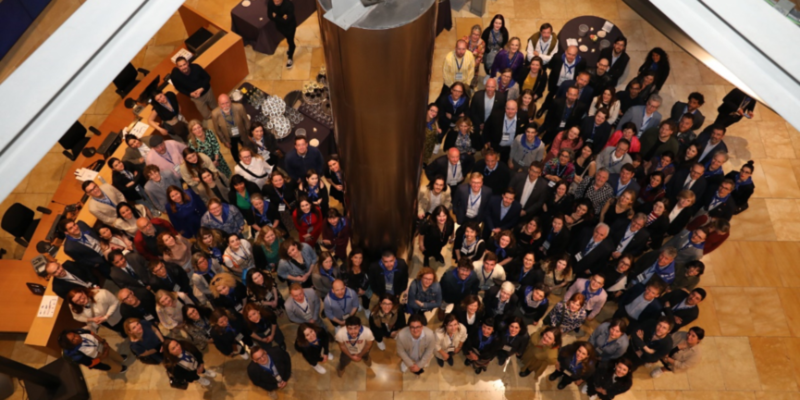In This Section
Cross-European university alliance receives €14.4m in new funding

- €14.4m EU further funding for alliance of universities in ten countries including Ireland, Spain, Germany.
- University College Cork to receive €1.87m in funding
- Strategic alliance opens up opportunities for students to study across Europe
An alliance of universities in post-industrial European cities – including University College Cork - has been awarded €14.4m in funding for its next phase, an indication of the project’s success to date.
The strategic partnership “affords opportunities for a truly European experience” to students, staff, and collaborators, allowing them to study, teach, and research at member institutions across the continent.
The European University of Cities in Post-Industrial Transition (UNIC) has secured the funding in the 2023 Erasmus+ European Universities Call, and its next phase will see a renewed focus on social impact, innovative educational initiatives, and deepened academic engagement.
UCC - a founding member of UNIC since 2020, - has been awarded €1.87 million as part of the award.
The funding will enable the implementation of an expanded, ambitious new mission for UNIC over the next four years, leading a transition into the future of the European Higher Education Area.
Building on the foundations established in the last three years, UNIC’s renewed objectives will centre on unlocking models of inter-institutional learning, teaching, and research that are profoundly engaged with diverse post-industrial urban ecosystems. Staff and student mobility will also remain at the core of UNIC’s work.
Starting from October 2023, the alliance will roll out new programmes and expand existing offerings that reflect its renewed mission:
The UNIC MSc in Redesigning the Post-Industrial City will accept its first cohort in the 2023 autumn semester. This new programme will educate the next generation of urban specialists with the 21st-century skills and knowledge needed to address the challenges and opportunities of cities in transition and superdiverse societies.
The UNIC Centre for City Futures will become operational: a new “one-stop-shop” infrastructure built to enable universities to engage with cities, communities, and stakeholders for transformative innovation. It brings learning and research to the cities and communities, and the needs of cities and communities into learning and research.
As education changes, technology must keep up with the times. UNIC’s innovative Hybrid Campus will set the foundations for state-of-the-art mutual exchanges, opening up Blended Intensive Programmes, virtual courses, and joint degrees to an even wider community of students, researchers and citizens.
UNIC will facilitate a broader, whole-university approach through Thematic Lines - new collaborative structures that act like UNIC ‘faculties’ around specific areas of post-industrial transition (such as sustainability, arts and culture, resilience and digitization, security, inclusion, entrepreneurship, and health and wellbeing), providing content and community for UNIC’s innovation in education, engagement and cooperation capacities.
Professor John O’Halloran, President of UCC, said: “As an alliance of universities working in partnership with their cities, one could have never imagined at the onset how truly transformational UNIC would be in consolidating the relationship between UCC, the city of Cork and our university and city partners across Europe, making this one of the biggest alliances in which UCC in partnership with Cork City has taken an active role.”
Fearghal Reidy, Director of Strategic and Economic Development, Cork City Council said: "As a learning city, the engaged research and learning infrastructure that will be developed through the UNIC Centre for City Futures is of central importance to Cork City Council, and all city stakeholders, as we implement our City Development Plan 2022-2028 and embark on our new Local Economic and Community Plan 2023-2029; and support achievement of our shared ambitions for Cork City and the South Region.".
Professor Ursula Kilkelly, Vice-President for Global Engagement of UCC, said: "Strategic international partnerships are and will be a key element of UCC’s global engagement plan. The deepening of the relationships with our UNIC partners, as represented by this second phase of funding, affords opportunities for a truly European experience to our students, staff, and collaborators, to build meaningful international networks and drive positive impact within our local and European communities.“
Dr Jean van Sinderen-Law, Associate Vice-President and UNIC Director at UCC said: “Building on the success of the last three years, i.e. the new relationships, the new pathways for students, the shared learnings, and the enabled appreciation and value of diversity and inclusion, UCC greatly welcomes this opportunity to further deliver on its ambition as a truly global university with a European focus.”
The European University of Cities in Post-Industrial Transition – expanded to ten universities from the founding eight – started in 2020 from a successful Erasmus+ grant designed to foster the quality, inclusiveness, and competitiveness of European higher education.
Since then, UNIC has built a rich diversity of activities and new offerings for students, researchers, staff, and citizens across Europe. It has enabled enhanced mobility through hybrid campuses and course offerings, established a joint MSc programme, and offered an Engaged Research seed fund for collaborative research projects. It has created communities of practice through flagship “CityLabs”, which create opportunities for knowledge exchange and co-creation between universities and their cities.
UNIC partner universities include:
- University of Deusto, Bilbao, Spain
- Ruhr University Bochum, Bochum, Germany
- University College Cork, Cork, Ireland
- Koç University, Istanbul, TurkeyUniversity of Liège, Liège, Belgium
- University of Lodz, Łódź, Poland
- Malmö University, Malmö, Sweden
- University of Oulu, Oulu, Finland
- Erasmus University Rotterdam, Rotterdam, The Netherlands
- University of Zagreb, Zagreb, Croatia
